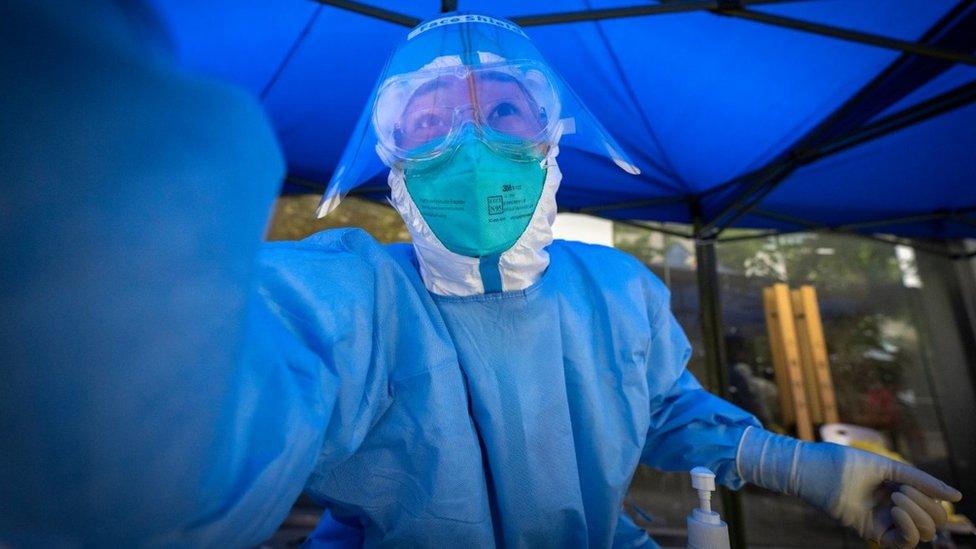China Covid: Hospitals under strain in wave of infections
- Published
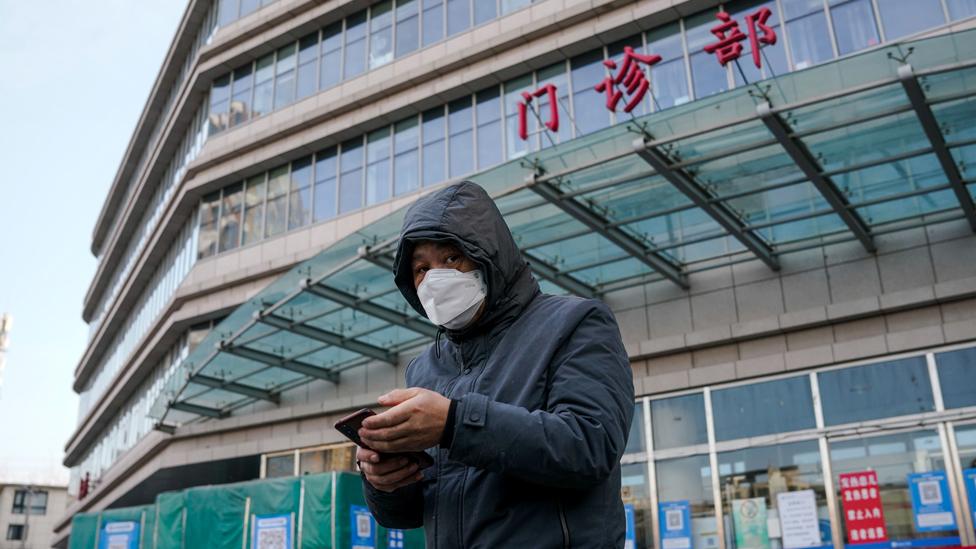
A man outside a hospital in Beijing - the healthcare system is under huge strain as Covid restrictions ease
China's hospitals are already under so much pressure, following the country's rapid 180-degree shift in Covid policy, that doctors and nurses could be infecting patients.
It seems frontline medical workers are being told to come in even if they have the virus themselves because of staff shortages.
A Chinese professor specialising in health policy has been monitoring the crisis in his home country from Yale University in the United States.
Chen Xi told the BBC that he has been speaking to hospital directors and other medical staff in China about the massive strains on the system right now.
"People who've been infected have been required to work in the hospitals which creates a transmission environment there," he said.
China's hospitals have hastily increased their fever ward capacity to meet a huge influx of patients, but these have been filling up quickly, in part because the message is still not getting through that it is all right to stay at home if you catch the virus.
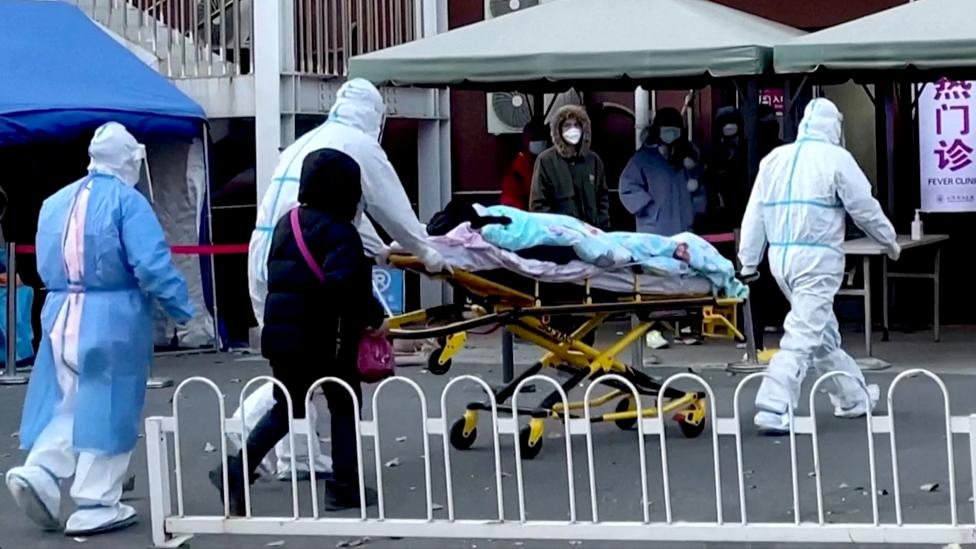
Medical staff move a patient into a fever clinic at Chaoyang Hospital in Beijing
Prof Chen says much more needs to be done to explain this to people.
"There is no culture of staying at home for minor symptoms," he said. "When people feel sick they all go to hospitals, which may easily crash the healthcare system."
A rush on pharmacies has led to significant nationwide shortages of medicine used to treat a cold or the flu. Home testing kits for Covid are also hard to come by.
In Beijing, though restaurants are allowed to open again, they have very few customers and the streets are quiet.
Companies are telling employees they should return to the office, but many don't want to.
This all makes sense when you consider that, just weeks ago, the government was saying that there will be no swerving from zero-Covid, that those infected must go to centralised quarantine facilities and that lockdowns were necessary.
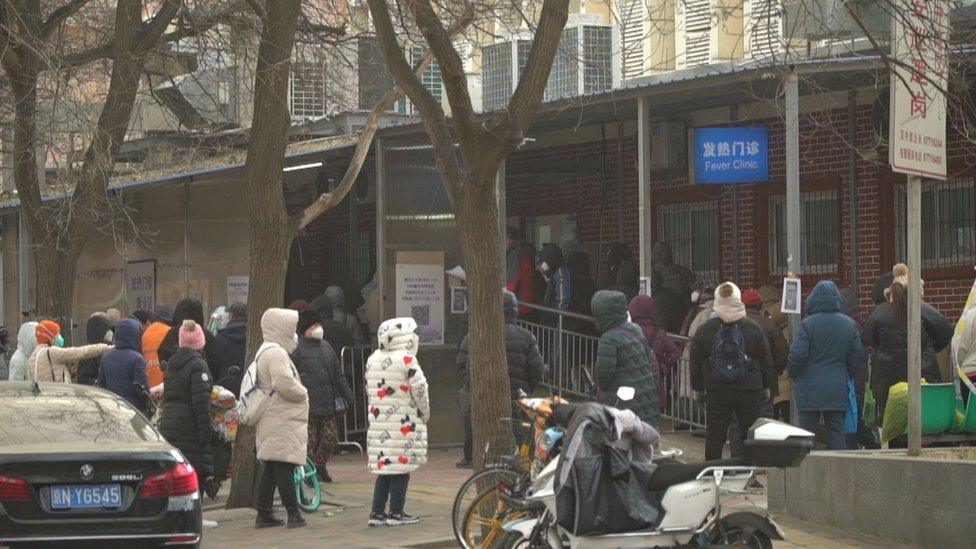
The queue outside a hospital's fever clinic in Beijing on Monday
The coronavirus was something to fear and Chinese people were lucky to live here because the Communist Party would not sacrifice them on the altar of opening up.
Now the goal of returning each outbreak to zero cases has been abandoned, Covid is spreading like wildfire and the line from the government is that catching this disease is not something to worry about.
China's easing of Covid restrictions was expected to unfold more slowly, much more gradually.
Then came street protests, in city after city, with demonstrators demanding their old lives back. They wanted to be free to move around again. There were clashes with police and the chant was going up for China's leader Xi Jinping to resign and for the Communist Party to give up power.
This was the straw that broke zero-Covid's back.
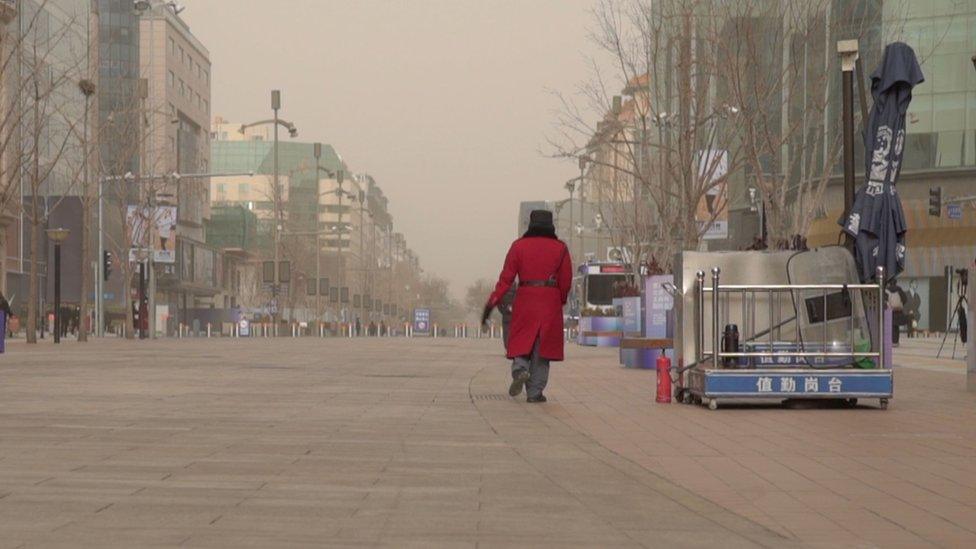
An empty shopping street in Beijing this week
According to Prof Chen, this meant that the timing of China's re-opening was "not ideal" but they had to do it.
He said countries like Singapore and New Zealand made their changes when infections were at bay. However, China has moved with full-blown outbreaks under way in cities like Beijing.
The government "heard the voice of the protesters", he said, but added that this was not the ideal choice for them in terms of timing.
So the protesters may have won, but the speed of the cave-in from the government has left elderly people afraid to leave their homes.
One woman we met going for a walk with her grandson said she would stay clear of crowded places, that she would keep wearing a mask and continue to wash her hands regularly.
Yet a reluctance to be in places where infection is more likely permeates all groups in society.
The impact on Beijing has been great.
Another reason restaurants are empty is that the city government still requires a negative PCR test result within 48 hours to dine inside. However, the majority of results are not coming through to health code phone apps.
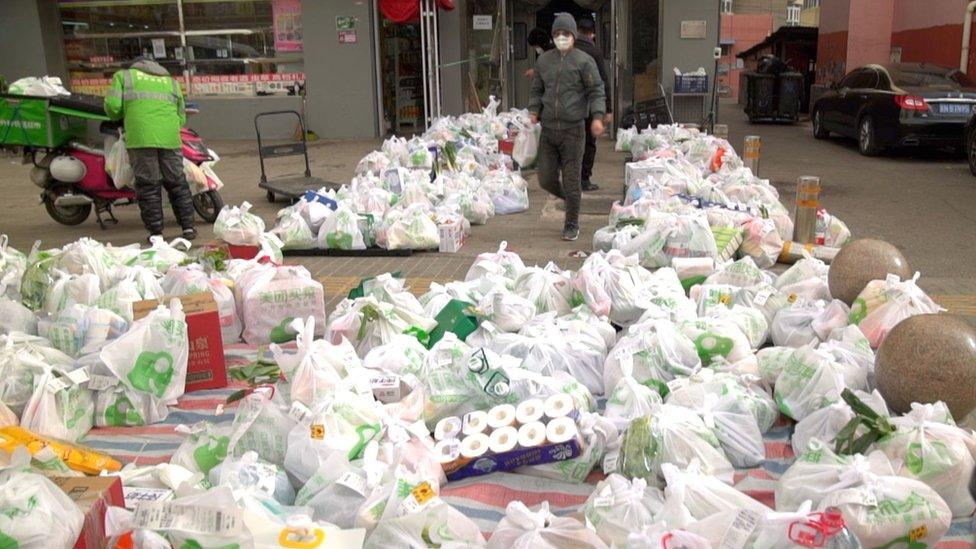
Delivery services of food and groceries are still seeing high demand as Beijing residents remain cautious on venturing outside
This seems to be because the labs have been swamped with work now that Covid is spreading so rapidly.
A 34-year-old woman, who is isolating at home after catching Covid, told the BBC that the experience, so far, has been surprisingly smooth.
She said her symptoms have not been as bad as she had expected them to be and that she has everything she needs.
She also said she was much happier to have the option of recovering at home with her husband rather than in a crowded quarantine centre.
However, she too worries. She has a sister with young children, parents living alone in their hometown and a grandmother who all have to get through this period.
Doctors are taking to social media in an attempt reassure people that it is fine for them to remain at home after they catch Covid.
Officials have also started to transform China's Covid isolation centres into temporary hospital facilities, to cope with an explosion of infections.
In just one day this week, 22,000 people in Beijing tried to get into a fever clinic.
Questions are being asked.
Why didn't the government prepare for this earlier, with an expansion of hospital ICU capacity?
Why has it taken so long to make this switch when countries around the world had already done it?
Why did Xi Jinping's administration allow the zero-Covid approach to cause so much damage to the economy more broadly and people's livelihoods more specifically?
A renewed vaccination push has started but it too should have come before China reached this stage.
The government says it is the virus which has changed, that newer strains are less dangerous and that this has meant the time was right to alter the response.
Either way, there is much more optimism now.
A group of overseas Chinese have set up a special chat on the Wechat app so that people living in other countries can share their experiences of having Covid with users in China.
The goal is simple. Calm nerves.
For sure, the next couple of months are going to be tough here. Millions of people are going to get sick and there will be many deaths.
However, the old approach was clearly unsustainable and, at last, people can see a way out.
Related topics
- Published7 December 2022
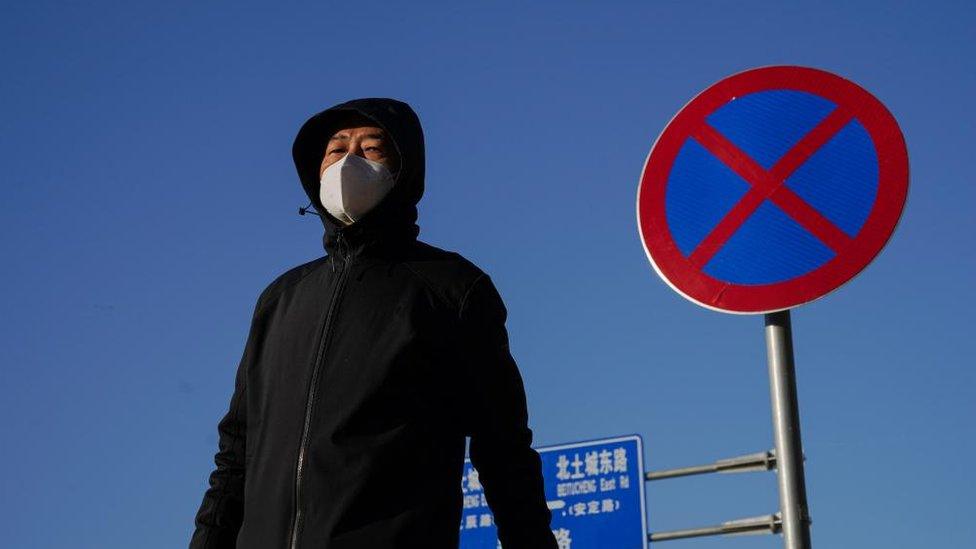
- Published8 December 2022
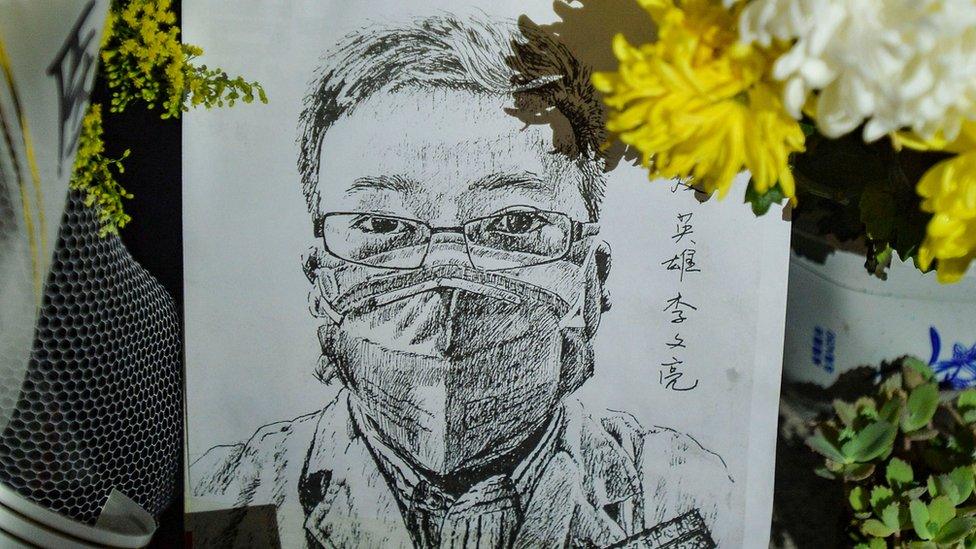
- Published2 December 2022
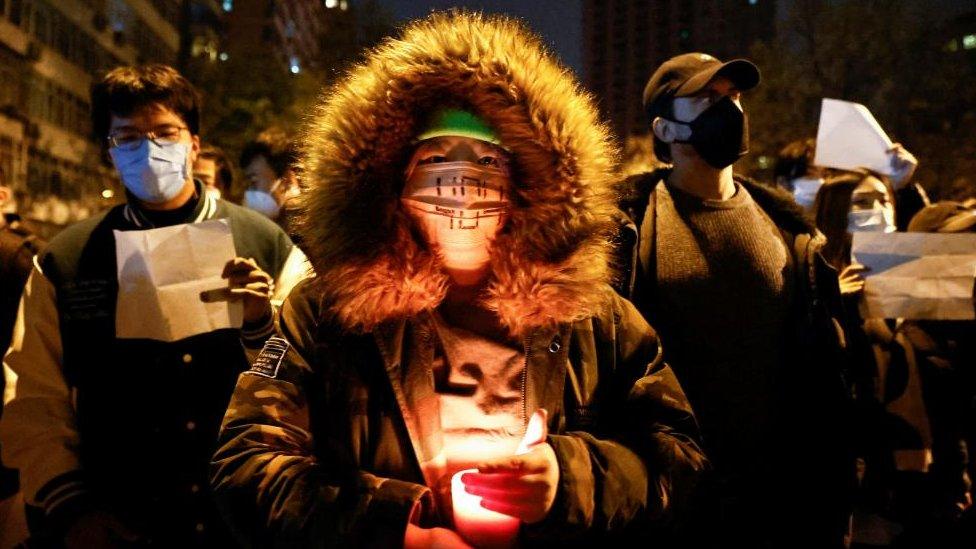
- Published7 December 2022
